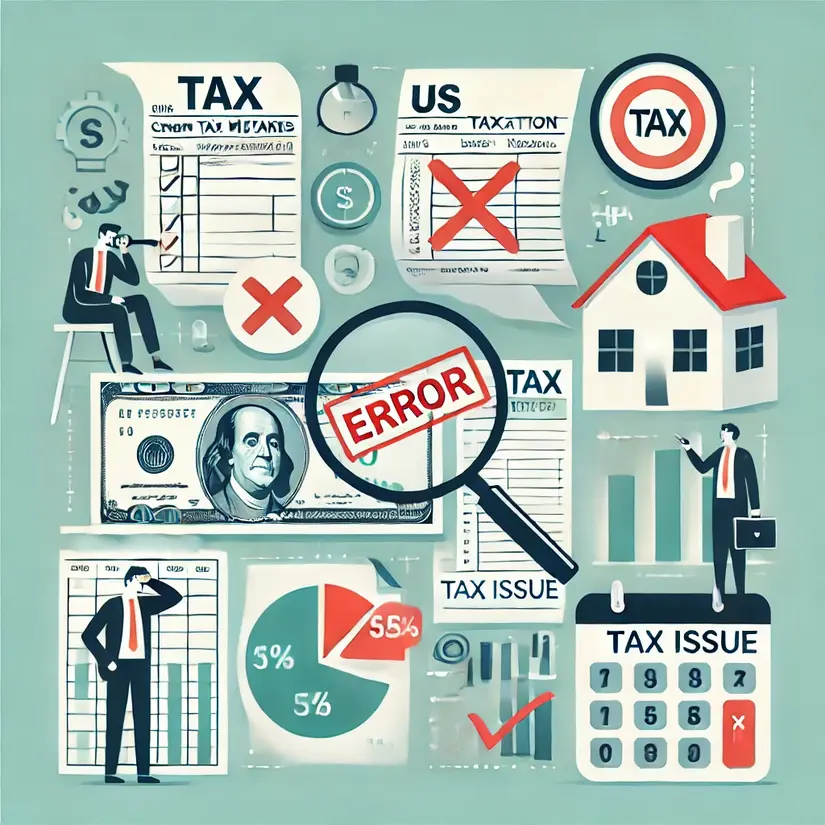It is very important to understand that making mistakes on the tax returns can lead to unnecessary huge penalties. Here are few common mistakes and how to avoid such mistakes.
- Failing to File a US Tax Return.
- Reporting only US source income and not reporting foreign income.
- Not Seeking Professional help.
- Preparing return on own by copying prior year return.
- Not reporting Foreign bank account and Foreign financial assets on the tax return.
- Failing to understand the difference between deduction and credit and its impact on the tax return.
- Not claiming the Foreign earned income exclusion and Housing exclusion.
- Reporting only Wage income and ignoring all the other source of incomes.
- Not using the accurate currency exchange rates.
Note that this post isn’t formal tax advice. This article was produced by Suma Abhishek, a US qualified tax specialist.
Mistakes that US Expats Make with regards to US Tax Return
Not filing a US Tax Return
Expats often mistake that since they are living abroad, they don’t have to file an US tax return. However, US citizens should file their tax return even when they are on assignment to foreign country or have moved permanently to the other country.
Even when there is no tax due, they have to file the tax return. Failing to file will lead to huge penalties.
US Expats get automatic extension of 2 months and they can file the tax return by June 15th.
It is important to understand that all the US citizens living abroad, should file their US tax return when they are meeting the threshold.
Reporting only US source income and not reporting foreign income
US Citizen often misunderstand that they have to report only their US source income on the US tax return. However, it is important to understand that they have to report their worldwide income on their US tax return.
Worldwide income includes Wages, Passive income such as Rental and any investment income etc. They are also eligible to take deduction for any mortgage interest paid in the foreign country and claim the expenses incurred against the rental income.
For example: If your wages earned in Netherlands is $70,000 and $20,000 dividends from an US brokerage account, you have to report both $70,000 and $20,000 on your US tax return even though the wages are earned in Netherlands.
Not seeking professional help
Expats usually try to research on the US Tax obligations on their own and file the tax return. This results in errors and missed opportunities.
US taxpayers living abroad may have to report their income on various forms other than 1040. Hence, it is always advised to approach a tax professional. This will help you avoid mistake and be compliant with both US and Foreign tax laws.
Preparing return on your own by copying prior year return
For instance, Taxpayer was in the US in 2022 and prepared tax return on his own. However, he travels abroad in 2023 on assignment and thinking that the same rules apply, he prepares the same tax return as 2022 in 2023. This again results in errors.
It is important to comply with the yearly tax update and know the rules and thresholds while filing the US tax return when staying abroad.
Not reporting Foreign bank account and Foreign financial assets on the tax return
If your foreign bank account value exceeds $10,000 at any time during the year, you must file form FinCEN 114 (FBAR). And prepare form 8939 when the you own foreign financial assets and the value exceeds the threshold limit.
Many expats fail to prepare these two forms (FBAR and 8938) when the threshold is crossed. 8938 is filed along with form 1040, and FBAR can be separately filed.

Failing to understand the difference between deduction and credit and its impact on the tax return
Many expats miss out on claiming available credits and taking the deductions due to lack of knowledge on the eligibility criteria and misunderstanding. There are foreign earned income exclusions and foreign tax credits available. Hence, it is always better to seek a tax professional help.
Not claiming the Foreign earned income exclusion and Housing exclusion
Most of the expats do not know that they can take exclusion for the income earned during their stay in foreign country. They can also take Housing exclusion. This helps in reducing the foreign wages that are subject to US tax.
Not claiming exclusion will result in huge tax liability. Not all the income types quality for FEIE. Sometimes foreign tax credit may be beneficial. Filing return independently in these cases is very tricky.
Reporting only Wage income and ignoring all the other source of incomes
Expats often misunderstand that they have to report only the wage income. This is not true. They have to report their business income, investment income, foreign assets, Interest in any foreign corporations, gifts from foreign nationals etc.
Not reporting these income will be a huge mistake and may receive tax notice from the IRS.
Not using the accurate currency exchange rates
While reporting foreign income and expenses, expatriates sometimes do not understand the need to convert amounts into U.S. dollars using the appropriate exchange rates. Incorrect currency conversions can lead to inaccuracies in your reported income and potential discrepancies.
Use the IRS average exchange rate or the spot rate on the date of the transaction for converting foreign amounts. Maintain documentation of the exchange rates used. For reporting Foreign bank accounts, Treasury rates can be used.
Conclusion
Filing US tax return as an expat can be really challenging. Understanding these mistakes and being aware of the errors can help you file the return accurately. It is always important to seek a tax professional help who is expert in filing expat tax return in order to be compliant with all the reporting requirement in both US and Foreign tax laws.
Pained by financial indecision? Want to invest with Adam?

Adam is an internationally recognised author on financial matters, with over 760.2 million answer views on Quora.com, a widely sold book on Amazon, and a contributor on Forbes.

















%20(2)%20(1).jpg)


Discussion about this post